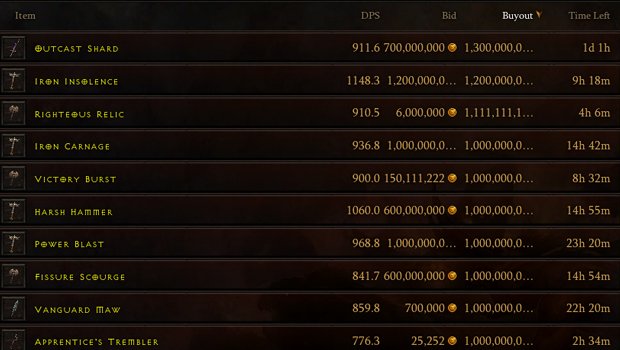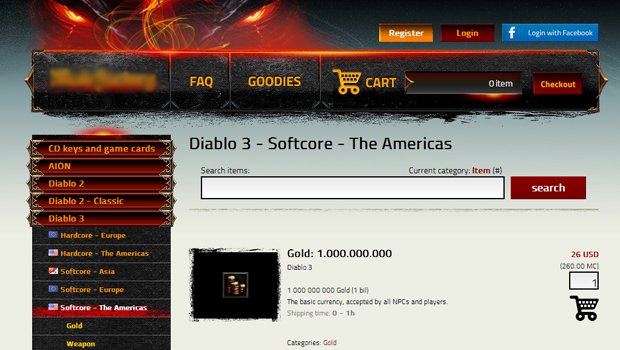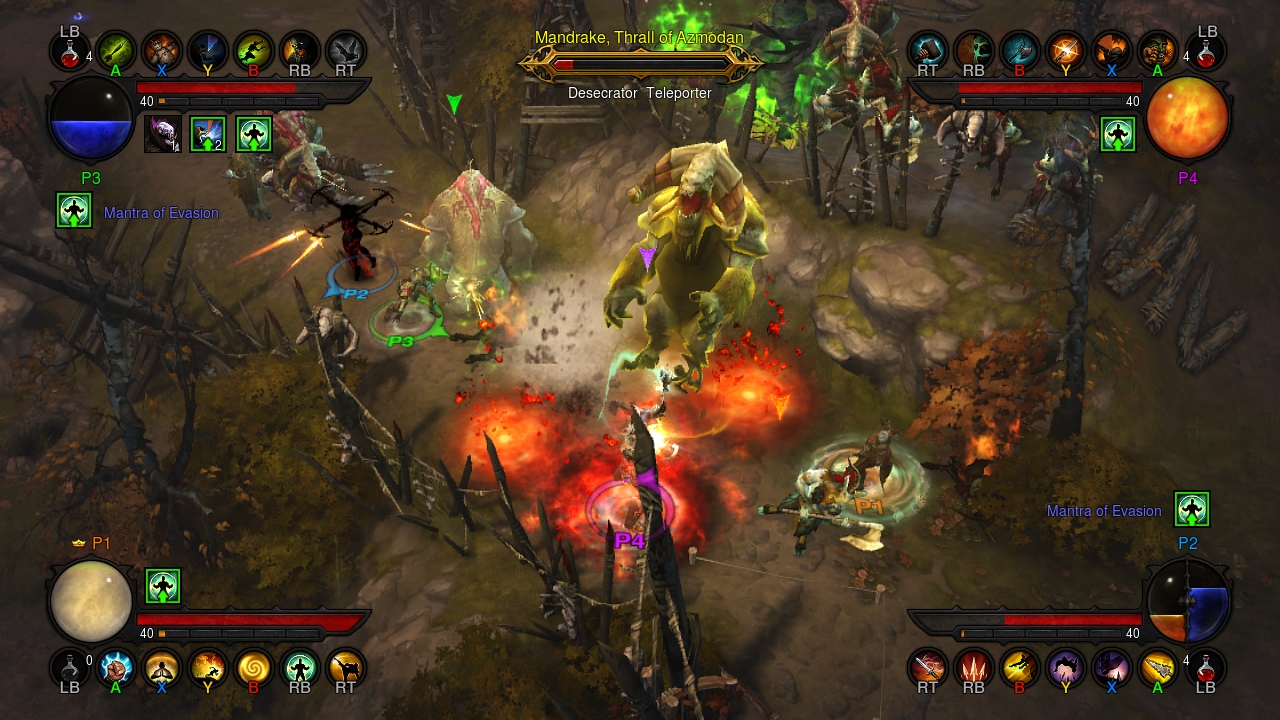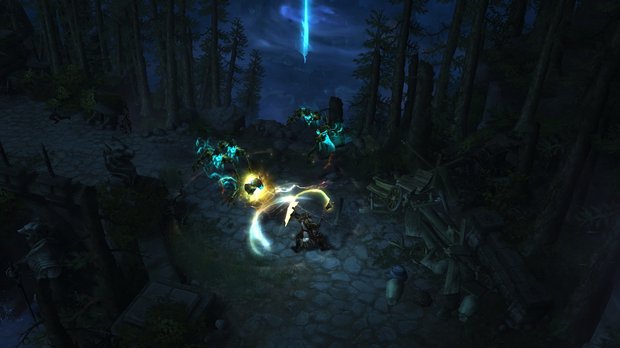Diablo 3's Auction House closure finally has us excited for its expansion
No matter how you hack or slash it, Diablo 3 is a great game. Its slick graphical style and foreboding atmosphere might've been offset by a lackluster plot, but none will deny how addictive and satisfying the classic Diablo gameplay can be. Unfortunately, all that content was undermined by the inclusion of a single feature: the Auction House. This player-run economy was supposed to replace the mercurial bartering system that players adopted in Diablo 2. Gold would have actual value now, and items could be purchased with real money. It sounded like a utopia for profiteering gamers. And it failed miserably. That's why today's announcement that Blizzard is axing the Auction House should be applauded by action RPG fans 'round the world.

Fans felt cheated by the Auction House, and for good reason--it took the focus away from the actual act of attaining loot, something Blizzard explicitly stated in its capitulation. One of the primary motivators in the Diablo franchise is the acquisition of sweet, sweet loot: rare gear drops that could ostensibly turn your hero into a monster-slaying powerhouse, or be traded away for the items you're looking for. The Auction House let gamers buy power with money--a loathsome trade, even if the majority of that money was going to other players' pockets. The effort to make gold valuable again backfired completely, because gold farmers and plentiful bot usage made the value of the in-game currency deflate at an alarming rate. Its inclusion felt like a design move fueled purely by greed.
The Auction House was enough to turn some gamers off entirely, cheapening the game they had been anticipating for years. Instead of being able to identify skilled or dedicated players by their tricked-out gear, anyone could buy their way to the winner's circle. And even if you did acquire a piece of impressive loot--whether you earned it with effort or charged it to your credit card--there was always the creeping dread that you would find something better within minutes, effectively rendering your new treasure useless. The satisfying feedback loop of effort-and-reward had been thrown out of whack, and what had once felt addictive now seemed like nothing more than a grind. Hardcore players and casual demon-slayers alike felt completely disillusioned, bewildered by all the damage the Auction House had done to Diablo 3's overall enjoyment.

This disaster wasn't unforeseen. In the months leading up to Diablo 3's release, Blizzard stood their ground while forum-goers and dedicated fans cried foul of the repercussions of an Auction House. During the early days of launch, players were already starting to notice how rapidly gold was becoming worthless (when Error 37 wasn't locking them out). For months after, Blizzard tried to assuage the tumultuous prices of the Auction House by installing gold floors--and even those dismal prices were undercut by gold-buying sites with frightening speed.
Then, a revelation: News that the console port of Diablo 3 would be playable offline, and would abolish the Auction House entirely. Suddenly, PC gamers had reason to take note of their console brethren, wondering aloud to themselves: Would console gamers be getting the better end of the deal? The lack of an Auction House might've been a detriment for players that wanted a fast track to godlike power. But for many, it was a callback to the loot ecosystem they knew and loved: finding loot and trading it with friends, or striving to collect that one elusive item. If you didn't have the gear you needed, all you could do was go out there and get it.

When Blizzard announced Diablo 3's expansion, Reaper of Souls, any moments of excitement were tempered by wince-worthy memories of the Auction House. Many had abandoned Diablo 3 altogether; despite the lack of any subscription fees, they felt zero desire to continue playing. Those who were still invested in the Auction House had to wonder what kind of chaos their market would be thrown into once people flocked back to the game, which could likely bankrupt all the in-game gold hoarders.
Things went quiet for a bit--then, today, without warning, Blizzard announced plans to shut down the gold and real-money Auction Houses in March 2014. In a moment of humility, they admitted the faults of their existing model, vowing to fix it before the revitalization that is Reaper of Souls. Diablo fans, that feeling you're feeling right now is glee. No more Auction House quite possibly means a return to the communal trading of old, just like the days (and nights) you spent transfixed to Diablo 2. Vilified Diablo 3 game director Jay Wilson is a thing of the past; in his place are people like Josh Mosqueira, who acknowledge that "the right decision is to preserve the integrity of the gameplay experience of Diablo."
Sign up to the GamesRadar+ Newsletter
Weekly digests, tales from the communities you love, and more

Only gold farmers will mourn when the Auction House crumbles, as they'll no longer have a virtual market to exploit. Those who haven't played Diablo 3 in months will be completely unaffected--their gold and items are likely worthless now anyway. And for profiteers who managed to eke out a few bucks from item sales, well, they can go stuff themselves.
So yes--if you've ever loved a Diablo game in your life, this is fantastic news. Even if it took Blizzard well over a year to admit their failures, Reaper of Souls will be a clean slate, infusing life into a dying game. Just as Lord of Destruction revitalized Diablo 2, Reaper of Souls could make Diablo 3 feel new--and appealing--all over again, and the banishment of the Auction House makes it easier to forgive the old wounds. To gold farmers: You will not be missed. To everyone else: You can now look forward to Diablo 3: Reaper of Souls.
Lucas Sullivan is the former US Managing Editor of GamesRadar+. Lucas spent seven years working for GR, starting as an Associate Editor in 2012 before climbing the ranks. He left us in 2019 to pursue a career path on the other side of the fence, joining 2K Games as a Global Content Manager. Lucas doesn't get to write about games like Borderlands and Mafia anymore, but he does get to help make and market them.



